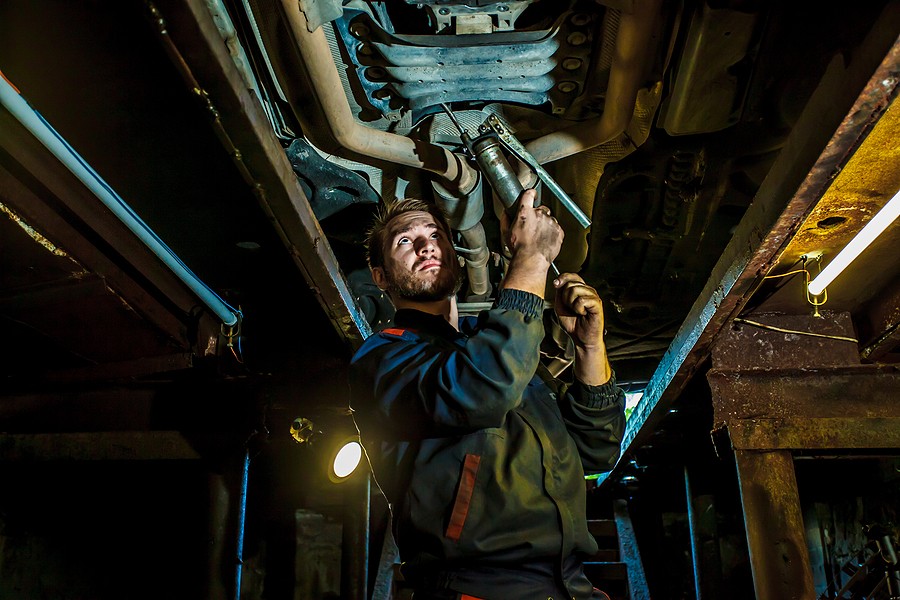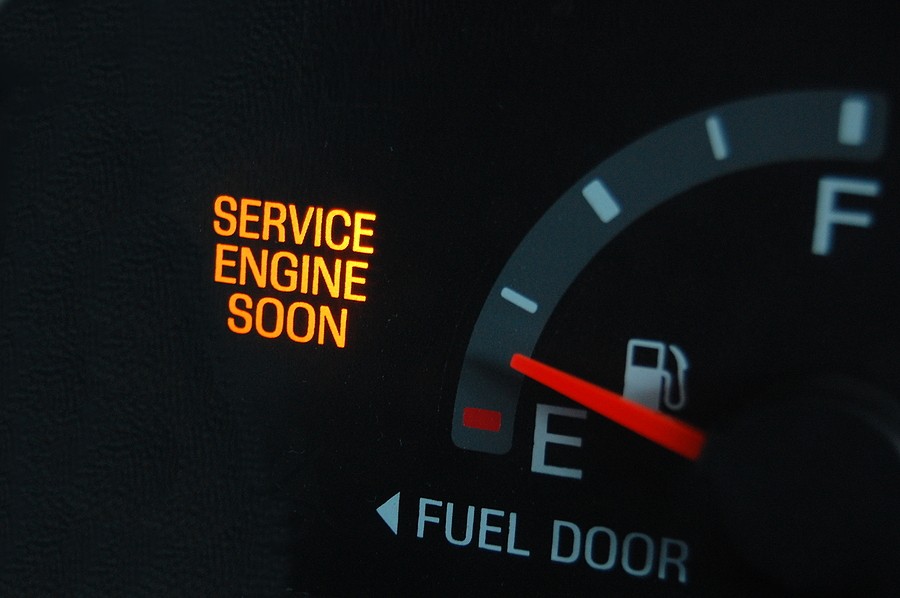If you're dealing with a check engine light illuminating, here are the 10 causes for a check engine light:
- Bad oxygen sensor
- Loose gas cap
- Bad ignition coil
- Malfunctioning catalytic converter
- Faulty spark plug
- Vacuum hose leaks
- Bad mass airflow sensor
- Faulty exhaust gas recirculation valve
- Incompatible aftermarket alarm
- Bad battery charging system
Your vehicle relies on the warning lights on the dashboard to communicate with you and bring your attention to internal issues. Sometimes these warning lights might be related to a simple issue that you can resolve on your own while in other instances; it might be related to a significant problem that requires immediate attention from your mechanic.
The check engine light is a very common warning light, and you will come across this multiple times during the lifetime of your car. However, you don't have to be nervous about it, and you don't have to panic. What's more important is to understand what could trigger this check engine light and take immediate action to resolve it, especially if it's related to a significant problem. You can't tell if the issue triggering the check engine light is minor or major until you do so something.
While there are tons of reasons for triggering the check engine light, they are more common than others, and that's why in this article, we will highlight ten causes for check engine light. First, you must familiarize yourself with this list and understand what these causes mean for expensive repairs. Then, when you speak to your mechanic, you don't get surprised by the expected repair options and repair costs.

Why is it important never to ignore a check engine light?
As we mentioned earlier, when your vehicle triggers a warning light on the dashboard, something is wrong.
When the warning light is related to a significant component like the engine, you have to take it seriously because it immediately means that you will deal with significant repair costs if you ignore this check engine light.
Many experts confirmed that if you monitored your vehicle's behavior and took every check engine light seriously, you'll most likely resolve most problems without needing to install new components. Thus, you don't have to worry about expensive repair costs and parts replacements.
However, this does not guarantee that it's the only point of time as your vehicle gets older; you might deal with significant engine problems. But at least you delay these problems as much as possible, so your engine and your vehicle serve you as long as possible.
10 causes for check engine light
The check engine light can be triggered due to any component that is interacting with the engine. Therefore, there is an overwhelming list of causes for triggering the check engine.
However, older move experts performed detailed analysis and came up with a list of the 10 causes of check engine lights that you might experience more frequently than others. Let's take a closer look at these causes:
1. Bad oxygen sensor
One of the most common causes for triggering the check engine light is a bad oxygen sensor. This sensor is located somewhere close to the catalytic converter, and it's responsible for monitoring how much oxygen is still in the exhaust.
Understanding the oxygen level helps your vehicle's computer learn about how good the combustion process was. In other words, your vehicle's computer will understand without your engine consumed all the required air and fuel at the right time or not. If that was not the case, then there could be a problem.
Since your vehicle's computer relies heavily on the oxygen sensor, when this sensor goes bad, the check engine light comes up immediately to have you resolve it. Otherwise, you can deal with other complications related to the improper air-fuel mixture, which means more complicated problems related to the engine cylinders.
If you confirm that you're dealing with a bad oxygen sensor, the only repair option would be to replace it with a brand new one. Luckily, replacing the sensor is not as expensive as dealing with cylinder problems that could require extensive labor and repair costs.
2. Loose gas cap
Surprisingly, sometimes the check engine light might be triggered by a minor problem like a loose gas cap. So we always say whenever you notice a check engine light, you should not panic because your problem could be minor.
Therefore, if you happen to deal with the check engine lights, the first thing to do is check on minor issues like a loose gas cap. Check the cap and confirm that it's not loose first, and then take a closer look at it to check if it has any issues or cracks that mean you need to replace it.
Replacing the fuel cap is not expensive. Instead, it's very cheap, which means you can get rid of your check engine light without consulting a mechanic. Thus, it leads to fewer repair options and lower repair costs.

3. Bad ignition coil
When the ignition coil goes bad, it leads to a long list of potential consequences. For instance, you will deal with vehicle stalling, reduction in fuel economy, a significant reduction in your vehicle’s overall energy and acceleration, etc.
Therefore, it won't be just a check engine light that you will notice all the other symptoms. Therefore, there won't be a reason for you to delay taking care of this problem because it impacts how you're using the vehicle and how your car functions.
4. Malfunctioning catalytic converter
The catalytic converter is one of the most expensive parts of your car. So if your check engine light is illuminating because of a catalytic converter, you're dealing with a critical situation.
The catalytic converter is responsible for filtering out the exhaust coming out of the combustion process and confirming that no harmful gases get to the environment except those with the right quantities depending on what's specified by the Environmental Protection Agency
When the catalytic converter fails, it will impact the overall vehicle performance, and you will notice any symptoms. However, the biggest concern about a faulty catalytic converter is failing the emission test. You will never pass the test if your car does not have a good catalytic converter.
Therefore, when dealing with catalytic converter problems, you have to consult your mechanic and understand the different repair options and repair costs. In some scenarios, a faulty catalytic converter might get to a situation where you have to give up on your car and sell it instead of wasting your time, energy, and money. This is the cause of repair options, and if your costs might get close to your vehicle's overall value, it doesn't make sense that you should spend this money to solve and fix one component that might not add much to your vehicle's overall value.

5. Faulty spark plug
As we mentioned earlier, your engine requires a specific amount of air and fuel for the combustion process. Unfortunately, this air fuel gets mixed and requires a spark buy a spark plug at the right time for the combustion process to be completed. Otherwise, your vehicle will not have energy, and the promise will not happen properly.
When dealing with a faulty spark plug, you'll notice tons of other symptoms, and in some severe scenarios, your vehicle might not even crank or start. If you're in progress, you must regularly check on the spark plugs and follow what is specified in your vehicle's owner’s manual in terms of when exactly you have to replace them. Of course, replacing the spark plugs depends on their quality and some other factors. Therefore, check with the manual for more details or consult a mechanic if you have a hard time finding this information in the manual.
6. Vacuum hose leaks
The engine compartment and the engine itself work in a closed system, which means maintaining a specific pressure. So there might be a situation where you can deal with vacuum hose leaks and this pressure for two weeks, which means the engine will not operate properly and will have to deal with some other complications.
That's why it is critical that whenever you check your vehicle's dashboard and notice a check engine light, your mechanic should perform a thorough inspection and confirm whether the issues are related to a vacuum leak.

7. Bad mass airflow sensor
Like the other components, the mass airflow sensor is also essential for your engine to operate properly. This sensor tells the engine how much air is coming to the engine compartment and how much it will get mixed with fuel to get burned.
If the mass airflow sensor doesn't work properly, the computer in your vehicle will lose track of how much air went inside the cylinders. Therefore, it becomes very challenging for the engine to decide when to ignite the air-fuel mixture and how to do so.
Therefore, if you confirm a bad mass airflow sensor, you'll have to replace it for your vehicle to operate properly. Ignoring this problem leads to other complications that might get to a point where you can't fix your car and will deal with major engine damage is when there is no help nearby.
8. Faulty exhaust gas recirculation valve
Another valve is involved in your vehicle's engine processes: the exhaust yes recirculation valve. This valve could be a potential culprit for triggering a check engine light, and that's why your mechanic should also check this one to confirm that the warning light is not related to a bad or faulty exhaust gas recirculation valve.
If you confirm that this valve is causing the issue, you'll have to fix it or replace it depending on what your mechanical decides.

9. Incompatible aftermarket alarm
Sometimes if we run out of original parts or we can't afford these parts, we might go with some aftermarket components. However, these aftermarket components might not work properly. Your vehicle might not be compatible with them here; therefore, the vehicle might trigger a check engine light once you install this part.
This is easy to detect the problem because you will notice that the check engine light is only triggered once you install the component, which means that the problems are most likely related to what you just installed. To avoid this situation from happening in the first place, always consider checking the aftermarket parts and confirming whether they will be compatible with your car or not rather than wasting your money and efforts hoping for it to work.
10. Bad battery charging system
Finally, if there's any problem with your vehicle's charging system and the battery, you might get to a point where you deal with a check engine light. Your mechanic needs to regularly check on the battery to confirm that the charging system doesn't have any issues.
Your mechanic needs to look at the battery itself and the connections. Sometimes the connections might be loose, and, in some instances, there might be some rust around the battery terminals which means you have to clean them for your vehicle to operate properly.

Final thoughts
The check engine light might be one of the scariest warning lights you could see on the dashboard. If you are an inexperienced driver, you might think that this light your engine is failing. However, that's not always the case.
This article walked you through 10 causes for a check engine light that you should familiarize yourself with to get you prepared for the next step whenever you deal with check engine light issues.
If you're a mechanic who confirmed that your check engine light is triggered because of an expensive component like a bad Catalytic converter, you might want to evaluate this situation and confirm that you will not pay for repairs.
According to an experts panel, if repair costs got close to 75% or more from your vehicle's value, you should sell the car instead of wasting your money hoping for it to get going. If you're looking for someone to purchase your vehicle with a bad catalytic converter or any bad parts, you should consult Cash Cars Buyer!
Cash Cars Buyer is one of the top-rated car removal companies in the nation that guarantees to pay you the top dollars and provide you with free towing despite your living location around the United States.
Our process is very straightforward and doesn't take more than a couple of days to get your car removed safely and for the most money.
All it takes you is to:
- Describe your car’s type and condition
- Receive our instant free quote
- Accept the quote
- Get your car removed and receive your cash payment on the spot!
To learn more about our process and our team, you can reach out to us by calling us at (773) 791-4363 or visiting our home page click on the free instant online offer.



